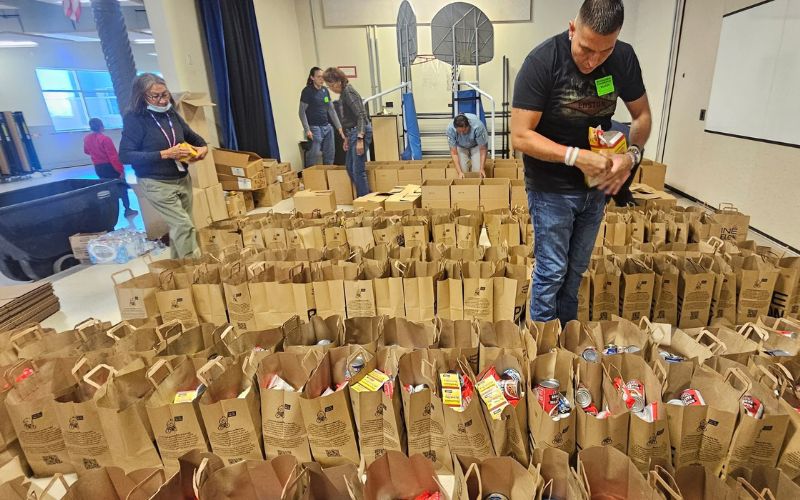
- Details
- By Elyse Wild
The additional 40,000 pounds of food Lisa Ansell Frazier ordered in October for the Buffalo Youth Nation Project will stock food lodges onsite at four Wind River Reservation schools through December. The Sweet Grass Lodge, the second tribal food bank that Frazier (Cheyenne River Sioux Tribe) keeps stocked with traditional and local foods, also grew its inventory to distribute food aid to more people.
Frazier's food orders, twice the size of a typical month, were done as tribes across the country saw disarray in Congress and forecasted a lengthy federal government shutdown, now in its 35th day. To brace for cuts to the Supplemental Nutrition Assistance Program, tribes and Native-led organizations are doing what Frazier has done in Wind River, and have leaned into their food distribution programs to feed relatives.
"Look into what your ancestors did," Frazier said. "Go back to making relatives with people. That sense of settler colonialism, where there's an isolation and a hierarchy that is very divisive and tiered and based on paper and material possessions — that is not our way. If you are healthy, then I am healthy."
More than 540,000 Native Americans receive SNAP benefits.
According to the Centers for Disease Control and Prevention (CDC), 65% of Native American households experience food insecurity — 10 times the national average.
Limited access to nutritional and traditional foods on reservations is tied to centuries of federal policies aimed at destroying Native cultures. Indian Removal Act, the Trail of Tears, and the Dawes Act, laws that drove the forced relocations of tribes and stripped them of hundreds of millions of acres of land.
Per federal law, tribal citizens cannot receive benefits from SNAP and Food Distribution Program on Indian Reservations (FDPIR) — a USDA program that provides packages of food directly to households — in the same month.
The Sweet Grass Food Lodge and the Buffalo Youth Nation Project (Wakanyeja Tatanka Oyate) are are two tribal food distribution programs on the Wind River Reservation in Wyoming that have seen more people request food aid during the shutdown.
The Buffalo Youth Nation Project food lodges have already seen an increased volume amid the news of the SNAP cuts. The school food programs have served more and more visitors who do not have students, Frazier said.
"[The support] is coming from Native to Native, so there's no shame, there's no condemnation, there's no superiority, there's none of that," Frazier said. "It's giving with no expectation other than the health and wellness of the community."
The Buffalo Youth Nation Project started in 2018 with a grant funded from the Wyoming Community Development Authority. It orders food from the Wyoming Food Bank. Schools stocked by the Buffalo Youth Nation Project have seen reading comprehension rates double, and attendance increased from 34 percent to 72 percent.
The food lodges began preparing for the fallout of slashed SNAP benefits weeks ago. Frazier told Native News Online the Buffalo Youth Nation Project increased its food order from 20,000 pounds to about 40,000 pounds for both November and December.
"All of the community can come in and get the food they need, but we've been having people come in who don't have children at the school," Frazier said. "Which is perfectly fine, but it's been increasing because of the looming cuts."
The food lodges have also spent funds to partner with hunters, meat processors, and local and regional farmers to meet the immediate demand.
This collaboration, Frazier said, reflects a core Native belief: that a connected community is a healthy community.
More than 2,000 miles from Wind River, Ralph Francis (Passamaquoddy) is making similar decisions as coordinator of the Passamaquoddy Pleasant Point Food Pantry.
"We are trying to stay ahead of the game; we want to run, not crawl. We don't want to be stagnant," Francis said.
The pantry serves up to 100 people a month, and many of the relatives Francis delivers food to on the remote reservation are elders, disabled, or don't have access to transportation.
Francis told Native News Online that last month the food pantry started to collaborate with more than a half-dozen non-tribal programs to prepare for the SNAP cuts.
"So if they don't have anything, I could go to them and get stuff, and if they don't have anything, I can give them stuff," Francis said. "We're doing a lot of collaborating and meeting with different people."
While hunters regularly donate deer and moose to the food pantry, Francis said their donations are coming in faster than usual — and some even from the First Nations Passamaquoddy community in Canada.
Francis said that while many people are struggling, he encourages those in need to reach out for help.
"No one should be ashamed of getting food for their families," Francis said. "This is what we do. We take care of our people."
More Stories Like This
New Mexico Will Investigate Forced Sterilization of Native American WomenUSDA Expands Aid for Lost Farming Revenue Due to 2025 Policies
Two Feathers Native American Family Services Wins 2026 Irvine Leadership Award
Bill Would Give Federal Marshals Authority to Help Tribes Find Missing Children
Indian Health Service to Phase Out Mercury-Containing Dental Amalgam by 2027


